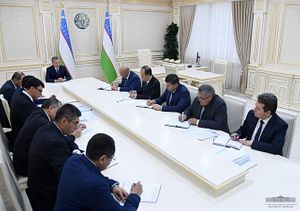Tashkent is set to become a dominant trade partner to Afghanistan as the two sides continue to negotiate on major projects.
Uzbekistan has focused on fostering trade relations both globally and regionally. Tashkent has chased and negotiated various trade opportunities, and one country that stands out is Afghanistan. In the first Intergovernmental Commission for Trade and Economic Cooperation meeting held on July 17, the sides agreed to accelerate trade, launch industrial projects, and build a new electricity line from Uzbekistan to Afghanistan. The timelines between announced intentions and actions in Afghan-Uzbek relations have been remarkably short.
At the July 17 meeting, Uzbekistan announced negotiations with Afghanistan to set up a joint assembly of cars in Kabul. Tashkent will reportedly be sending a delegation from UzAuto, Uzbekistan’s car producer, to Kabul to firm up these intentions. UzAuto has been enveloped in low sales and financial woes lately and the deal with Afghanistan could be a partial escape. The possibility of UzAuto becoming Afghanistan’s first car assembly plant is promising. It indicates not only interest on the Uzbek side, but a degree of optimism for peace prospects in Afghanistan.
Tashkent is also serious about serving as a transit country for Afghanistan. Following the meeting, Tashkent announced a 20 percent discount for the railway transit of grain and wheat flour from Kazakhstan to Afghanistan. Wheat flour is Afghanistan’s top import, and Kazakhstan alone supplies 78 percent of the product Afghanistan imports, followed by Pakistan. In addition to rail transits, Tashkent is also negotiating to position itself as an air transit hub for Afghan exports.
In May 2019 Uzbekistan opened an Afghanistan-Uzbekistan trade zone within the Termez Cargo Center terminal. Tashkent encouraged Kabul at the July meeting to use the terminal more actively. All these initiatives indicate that Tashkent clearly wants to become the main transit hub for goods entering and exiting Afghanistan.
In what seems to be a reciprocal economic offer, Afghanistan proposed that Uzbekistan tap into its estimated $1 trillion-dollar deposits of mineral resources. In particular, Kabul suggested Tashkent explore iron ore deposits in the Tirpul oil and gas basin.
At the beginning of July 2019, a high-level delegation from Uzbekistan headed by Prime Minister Abdulla Aripov visited Afghanistan. The main outcome of the meeting was an agreement to increase Uzbekistan’s electricity sales by 70 percent by way of the $110 million electricity line from Uzbekistan’s Surkhan to Afghanistan’s Pul-e-Khumri. A little less than half of the financing of the 250-km line will be covered by Uzbekistan and Tashkent is already conducting survey work leading to the construction phase. Although the project was in the works for several years, it was ultimately signed during Afghan President Ashraf Ghani’s visit to Tashkent in December 2017.
Another rapidly emerging cooperation area between the countries is the restoration of Afghanistan’s textile industry. The request for assistance came from Kabul only in July 2018 and trade associations of both counties signed a memorandum of understanding on April 8, 2019. Uzbekistan is set to rehabilitate Afghanistan’s textile enterprises to enable the processing of 60,000 tons of raw cotton into textile. In 2018, Uzbekistan produced 830,000 metric tons of raw cotton and processed two thirds of it; Tashkent will be able to share experience from its own recent transformations in this area.
Uzbekistan officials also watch trade statistics between the countries closely. After seeing a 19 percent increase in trade in 2018 compared to 2017, trade in 2019 is set to decline. The advisor to the Uzbek Prime Minister expressed alarm for the negative trend and called for correcting it.
Tashkent is serious about economic opportunities with Afghanistan and actively pursuing initiatives. Ghani’s visit to Tashkent in December 2017 set the cooperation rolling. Tashkent is serious about this cooperation as words quick proceed to action. The recent developments indicate how Kabul is also receptive to the cooperation and actively outreaching for economic cooperation that is an indication of country’s optimistic outlook for the economy of the country.
































